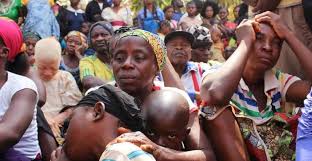No fewer than 127,754 urban poor will benefit from Federal Government Expanded Cash Transfer Programme in Kaduna State, the Coordinator, Mrs Nina Dawong, has said.
Dawong stated in Kaduna on Monday, that the beneficiaries would be captured in the COVID-19 Rapid Response Register (RRR). She explained that the RRR was an intervention under the Federal Ministry of Humanitarian Affairs, Disaster Management and Social Development.
She added that the intervention was to identify and document urban and semi urban poor that have lost their source of income and became poorer from the harsh economic impact of COVID-19.
She further said the RRR was being built nationwide by the National Social Safety-Nets Coordination Office as an expansion of the existing National Social Safety Nets Project, targeting non-traditional poor in urban and high-density locations.
According to her, individuals or households in the rapid response register will be paid N5,000 monthly for at least six months to boost their consumption and help to build their resilience.
“Unlike the Conditional Cash Transfer where beneficiaries are selected from the Social Register of the poorest of the poor and receive monthly stipends for three years, the RRR targets urban poor and beneficiaries will receive stipends for only six months.
To benefit from the programme, a person must have a phone number living within the targeted geographic area mainly in urban poor areas. The individual or households must also pass the validation checks that established the impact of the pandemic on their means of livelihood.”
The state coordinator said, geographical satellite remote sensing technology would be used to locate the urban poor wards and high-density settlements.
She added that targeting and enrollment of beneficiaries would be done using cellphone short messaging service technology that will allow residents of identified communities to register.
“This will be completed by following simple steps via Unstructured Supplementary Service Data (USSD) codes, integrated with the National Living Standard Survey assessment.
The target groups include small business owners, street vendors, petty-traders, small and medium enterprises, service providers, low wage price sector employees including wage-based labourers.
Others are urban poor and destitute such as persons with disabilities and vulnerable households in slum areas affected by the pandemic.”
She said the beneficiaries would be selected from 33 wards in 17 Local Government Areas (LGAs) of the state currently not benefiting from the Conditional Cash Transfer programme.
She identified the wards and lGAs as Kauru West and East in Kauru LGA, Idon, Kujama and Kasuwan Magani in Kajuru LGA; and Magajin Gari I and II in Birnin Gwari LGA.
Others, according to her, are Kaura Ward in Kaura LGA, Igabi Ward in Igabi LGA, Ninzam North, South and West in Sanga LGA; Wuciciri, Kaura, Dutsen Abba and Gyellesu Wards in Zaria LGA.
“There are also Chikun and Kujama Wards in Chikun LGA, Kafanchan A and B, Kaninkon, and Maigizo Wards in Jema’a LGA; Jere North and South and Kagarko North and South in Jere LGA.
Other wards include Lere in Lere LGA; Kachia Urban in Kachia LGA; Soba Ward in Soba LGA; Giwa Ward in Giwa LGA; Zangon Kataf in Zangon Kataf LGA; Kudan in Kudan LGA and Ikara Ward in Ikara LGA.

